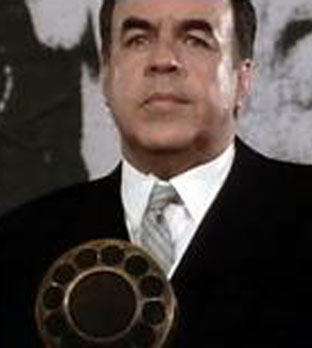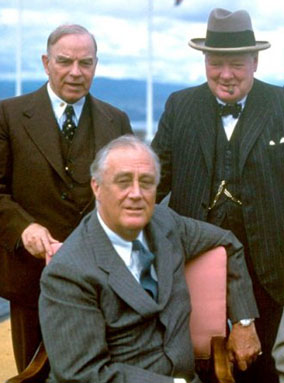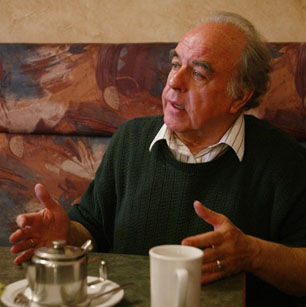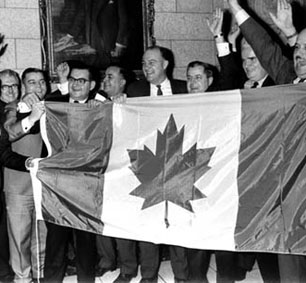RIP Sean McCann .. who among many other good things believed in the brilliant future of a Canadian republic
Jul 12th, 2019 | By Citizen X | Category: Canadian Republic
Last Friday – a week ago now – the Globe and Mail published an obituary for “Character actor Sean McCann” who died in Toronto “on June 13 of heart failure at the age of 83.”
The Toronto Star and Toronto Sun had earlier published their own commemorations – “Canadian actor Sean McCann dies at 83” and “Canadian actor Sean McCann fondly remembered.” There have been other such recent pieces, eg, “The Canadian Entertainment Industry Mourns the Passing of Actor Sean McCann.” And there is a good up-to-date article on Mr. McCann in the online Canadian Encyclopedia.
I quite casually bumped into Sean McCann myself on a number of occasions in his later life, in connection with his interest in what might be called the broad political future (with special reference to his home and native land).
This particular side of his career has not been well covered in other commemorations. And though I knew him only very slightly, it does seem to me worth underlining that, among many other things, Sean McCann was a strong believer in a free and democratic Canadian republic, as the ultimate destiny of the country for which he entertained a simple but passionate patriotism.

Vague hints about all this do appear in some mainstream media obituaries. Note the story about how a youthful Sean McCann working in London, England once yelled “Up the republic!” at Prince Philip’s limousine – and “before I knew it, I was being frisked and questioned.”
Several obituaries also stress Mr. McCann’s performance as legendary Canadian “Prime Minister Mackenzie King in Donald Brittain’s three-part mini-series The King Chronicle, which aired on CBC in 1988.” This was “his favourite part, hands down.”
(And for those who may have forgotten, Mackenzie King is the longest serving Canadian prime minister [1921-1926, 1926-1930, 1935-1948]. While far from admirable in many ways, he did win the 1926 federal election by arguing that the then still British-appointed Governor General of Canada, Lord Byng, had undemocratically thwarted the will of a duly elected Canadian prime minister. See, eg, Randall White’s take in “Age of the Incredible Canadian, 1921—1948.”)
As the Canadian Encyclopedia also points out : “McCann appeared as Ontario premier Mitchell Hepburn, opposite Beau Bridges and Kate Nelligan, in Million Dollar Babies (1994), the CBC miniseries about the Dionne quintuplets.” (And the demagogic Depression-era Liberal populist Mitch Hepburn was known in his day as “Canada’s Huey Long” – after the populist governor of Louisiana, whose benchmark slogan was “Every Man a King.”)
Somewhat closer to the dark real world of politics, Sean McCann actually ran for the provincial Liberals in the 1977 Ontario election – and quite honourably lost to Bill Davis’s popular Attorney General Roy McMurtry.

Most directly to the point of my concerns here, in the midst of all his other activities, over the past few decades in the country’s present largest metropolis Mr. McCann found time to help with the early beginnings of popular agitation for a future free and democratic Canadian republic .
(An activity of which Prime Minister William Lyon Mackenzie King – grandson of the 1837 “Upper Canada Rebellion” leader William Lyon Mackenzie – would almost certainly approve.)
From the early 21st century down to the recent past, Sean McCann joined with the likes of the late Toronto civil rights lawyer Charles Roach, former Toronto city councillor Tony O’Donohue, community leaders Tom Freda and Ashok Charles, and many more.
Like others of similar mind in other parts of the country, they continue to enthuse about how a free and democratic republic, altogether constitutionally unattached to any other sovereign country in the world today, is the logical and best possible outcome of “the long process of decolonization that Canada has undergone since 1867.”

(And this outcome has already begun to take some constitutional shape in the Constitution Act, 1982, with its Canadian Charter of Rights and Freedoms.)
Sean McCann was not someone who took any great interest in the legal technicalities of turning Canada’s present constitutional arrangements into those of a full-blown parliamentary democratic republic – on the model of such other former self-governing “British dominions” as Ireland or India. And this is something the cause of a Canadian republic does need to take more account of.
Yet Mr. McCann’s faith in a Canadian future anchored in the full formal recognition of the free and democratic sovereignty of the Canadian people, at last, was of a simpler, more elemental and emotional sort. It has its own raw power. And it is worth underlining today, when many challenges around the global village have at least temporarily brought back too many tired old uncertainties of a traditional (and even still somewhat colonialist) elite culture, never shared by any majority in our remarkable diverse country with its own brilliant future ahead.

